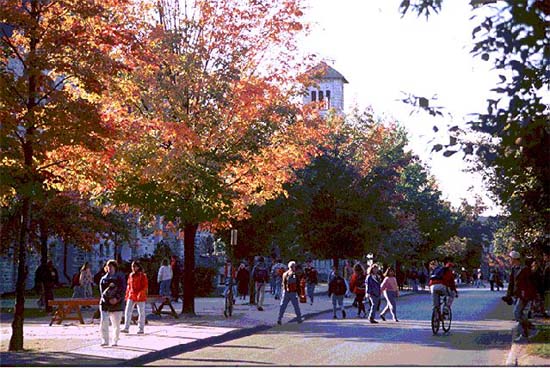
Peace Corps is looking for Community College Graduates
Peace Corps is looking for a Few Good Students
A Peace Corps worker teaches sustainable agriculture to a local resident. (Photo Courtesy of Peace Corps)
Sustainable agriculture students gain experience while working in the 5-acre land lab at CCCC’s Chatham County Campus.
Sanford, NC— Africa, Latin America and Asia may become three of the top destinations for Central Carolina Community College (CCCC) graduates in the near future. The Peace Corps is especially interested in graduates of CCCC’s sustainable agriculture program.
Sustainable agriculture majors match well with work in the Peace Corps because of the emphasis the program places on renewing resources. Students learn about the entire farming community, a valuable skill for volunteers heading to rural villages. Instruction focuses on ways to use traditional growing methods.
“As the requests for agricultural workers increase, the Peace Corps is expanding their search for volunteers to community colleges offering specialized training,” said Liz Demarest, Public Affairs Coordinator at Peace Corps headquarters in Washington, DC.
According to the Peace Corps website, sustainable agriculture skills are listed under a special section called “scarce skills”. There is an immediate need for volunteers in these skill areas.
Currently there are 19 Peace Corps assignment areas that fall within the environmental, health, community development, business and agricultural sectors. Community college graduates qualify to serve in 13 of the 19 sectors.
Another reason for the Peace Corps community college initiative according to Demarest is that community colleges reflect the diversity of the country. “We try to reflect diversity in our workforce,” she said.
The CCCC program has already reaped enrollment from people seeking skills to qualify for Peace Corps service. Some individuals returning from Peace Corps service have also turned to CCCC for additional skills in sustainable practices.
Nathan McClintock was a French major at UNC-Chapel Hill who served as a Peace Corps volunteer in Mali, West Africa. He describes his experiences as “life-changing. I knew that I wanted to continue to do ag work in developing countries, but I also knew that I needed more technical knowledge,” McClintock writes in a recent email interview from Senegal.
McClintock is currently in Senegal where he is working with the Rodale Institute, an organic agricultural research institute. As a master’s in science student in sustainable agriculture at North Carolina State University, he is working on a case study in composting for his thesis.
“ Upon returning to NC, I got a job managing an organic farm in Pittsboro and completed the (CCCC) sustaining farming program taking night classes,” McClintock explained. “I actually went about the sustainable farming program the wrong way, i.e., competed the certificate program after the Peace Corps.”
The (CCCC) program gave me hands-on experience and contact with farmers and time in the fields – practical experience,” he continued. “At CCCC I got the practical experience that I’m not getting at NCSU. Between the two, NCSU and CCCC’s sustainable ag program, I feel well prepared for more ag work.”
McClintock’s next stop is planned for Haiti where next year he plans to help a health clinic and adjoining community determine how best to practice sustainable agriculture at their center.
CCCC pioneered sustainable instruction in the North Carolina Community College System and is the only community college in the state offering this innovative major. As one of two community colleges in the nation (the other college is located in Iowa) that offers an Associate in Applied Science degree in sustainable agriculture, the program is showing steady growth.
In addition to the continuing education classes and degree program, certificates can be earned in sustainable agriculture, sustainable livestock production and sustainable vegetable production.
Instruction was first offered through the continuing education division of the college, but as interest grew and the demand for more advanced skills increased, the degree granting program was developed. Focusing on agricultural production that renews resources, the innovative major features course work in soil, plant and animal sciences, practical gardening skills, biological pest management, sustainable livestock management, greenhouse design, and agricultural marketing.
Research and planning started long before the first class was offered. The input of farmers and agricultural specialists and educators was gathered. Partnerships with sustainable growers’ associations and the North Carolina Cooperative Extension Service have also strengthened the program.
Interest has been widespread. While the majority of the sustainable majors currently enrolled hail from North Carolina, students from Michigan, Alabama and South Carolina have also matriculated at CCCC.
“I think that the sustainable program will continue to grow,” says Robin Kohanowich, director of sustainable agriculture at CCCC. “It’s not very common to teach these concepts in high schools and not many four-year universities have sustainable programs as a part of their curriculum. CCCC is leading the way in this effort to provide training for small farmers interested in environmentally friendly agricultural production.”
A five-acre land lab at CCCC’s Pittsboro campus allows students to dig into their studies. Students are actively involved in farm maintenance and all phases of crop production in the fields and in greenhouses. Coop experiences with working sustainable farms and businesses are also incorporated in the learning experience.
“People interested in serving with the Peace Corps are welcome,” said Kohanowich. “We are proud of our program and our instructors who have a passion for their work.” The sustainable farming program is located in the heart of North Carolina at the college’s Chatham County Campus near Chapel Hill, NC.
For more information on the sustainable agriculture programs at CCCC, contact Robin Kohanowich at (919) 542-6495, ext. 229 or rkohanowich@cccc.edu.
Media Contact:
Andrew Sawyer
Central Carolina Community College
(919) 718-7265
asawyer@cccc.edu
